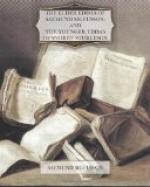19. Let a man hold the cup, yet of the mead drink moderately, speak sensibly or be silent. As of a fault no man will admonish thee, if thou goest betimes to sleep.
20. A greedy man, if he be not moderate, eats to his mortal sorrow. Oftentimes his belly draws laughter on a silly man, who among the prudent comes.
21. Cattle know when to go home, and then from grazing cease; but a foolish man never knows his stomach’s measure.
22. A miserable man, and ill-conditioned, sneers at every thing: one thing he knows not, which he ought to know, that he is not free from faults.
23. A foolish man is all night awake, pondering over everything; he then grows tired; and when morning comes, all is lament as before.
24. A foolish man thinks all who on him smile to be his friends; he feels it not, although they speak ill of him, when he sits among the clever.
25. A foolish man thinks all who speak him fair to be his friends; but he will find, if into court he comes, that he has few advocates.
26. A foolish man thinks he knows everything if placed in unexpected difficulty; but he knows not what to answer, if to the test he is put.
27. A foolish man, who among people comes, had best be silent; for no one knows that he knows nothing, unless he talks too much. He who previously knew nothing will still know nothing, talk he ever so much.
28. He thinks himself wise, who can ask questions and converse also; conceal his ignorance no one can, because it circulates among men.
29. He utters too many futile words who is never silent; a garrulous tongue, if it be not checked, sings often to its own harm.
30. For a gazing-stock no man shall have another, although he come a stranger to his house. Many a one thinks himself wise, if he is not questioned, and can sit in a dry habit.
31. Clever thinks himself the guest who jeers a guest, if he takes to flight. Knows it not certainly he who prates at meat, whether he babbles among foes.
32. Many men are mutually well-disposed, yet at table will torment each other. That strife will ever be; guest will guest irritate.
33. Early meals a man should often take, unless to a friend’s house he goes; else he will sit and mope, will seem half-famished, and can of few things inquire.
34. Long is and indirect the way to a bad friend’s, though by the road he dwell; but to a good friend’s the paths lie direct, though he be far away.
35. A guest should depart, not always stay in one place. The welcome becomes unwelcome, if he too long continues in another’s house.
36. One’s own house is best, small though it be; at home is every one his own master. Though he but two goats possess, and a straw-thatched cot, even that is better than begging.
37. One’s own house is best, small though it be, at home is every one his own master. Bleeding at heart is he, who has to ask for food at every meal-tide.




